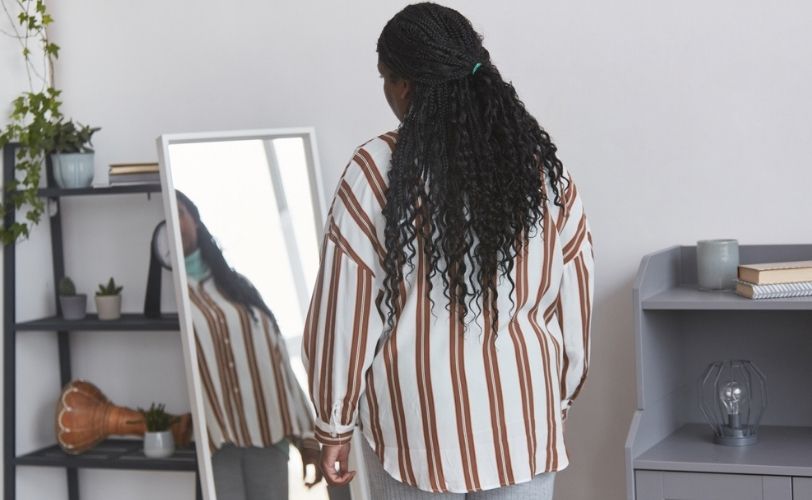Has the coronavirus triggered an increase in binge eating disorders?
The outbreak of COVID-19 has undoubtedly affected all of us in many different ways. And whilst some have enjoyed more free-time at home, perhaps even relished their furlough time (no judgement here!) for others, the pandemic has heightened vulnerabilities and turned fragile relationships into highly destructive ones.

In this instance, I’m talking about the relationship some have with food. Since the pandemic began, eating disorder charity BEAT recorded a 73% increase in people accessing their helpline for support, and just on Nutritionist Resource alone, individuals searching for binge eating support rose by over 130% over the course of last year.
Counsellor Harriet Frew, who specialises in eating disorders and body image, says that the pressure of the pandemic, particularly in lockdown, has created a ‘toxic mix’ that can lead individuals already vulnerable into disordered eating patterns.
“The pressure and focus on weight, shape and dieting drives behaviours like restrictive eating, which can easily lead to binge eating. In the first lockdown, there was a real pressure to get fit, go on a diet and make sure we were using that time productively in a way.
Food is a natural thing that we turn towards, to soothe and even distract us.
“In the pandemic, we’ve lost so many of our normal coping strategies and abilities to self soothe, pursue hobbies, generally being able to get out and live in the world that keeps us moving forward.”
This is true for Jessica, who has struggled with binge eating disorder in recent years, and found that the pandemic triggered some of her unhealthy eating behaviours. Jessica notes that the healthy, alternative self-soothing methods she had learnt to deal with emotional issues, became unavailable to her due to restrictions and instead she turned to food.
“Before coronavirus, I would visit my family or leave the house as soon as I felt the urge to binge, but that’s not possible right now. I can’t change my environment and that causes stress, boredom and a lack of control, so I binge. I stock up on food and now I’m home all the time, it’s incredibly difficult to manage those urges and I end up binging in secret to help me cope.
“The pandemic has brought so much stress and anxiety into all of our lives and for me, food feels like the only thing I can control. It’s ironic, because I actually can’t control my binging, so although I might think I have a handle on one thing in my life, really, it’s out of control.”
Understanding binge eating and COVID-19
If you’re struggling with episodes of binging, and even how to understand binging when you felt sure you’d overcome unhelpful behaviours, you’re not alone.
Jessica bravely admits that she is a perfectionist – a character trait common in individuals with binge eating disorder – and struggles with low self-esteem, a common issue many face with eating disorders. In Jessica’s case, her binging is about control, and a self-soothing method she has learnt to help manage difficult emotions, such as feeling overwhelmed or unable to act on decisions.
In this case, the pandemic is a catalyst for leaving individuals, who are already vulnerable, with damaging behaviours towards food, as it can feel like food is the only thing you can control. This can lead to frustration, shame, anger and even confusion.
Harriet suggests in order to help you understand your behaviour and eventually manage it, it can be helpful to start a journal. “Write a basic food and feelings diary. Don’t focus too much on food but jot down your feelings and any associated food intake alongside them. It’s about understanding your feelings, and starting to be aware of what is triggering.
“You can try to expand your repertoire of things that help you manage tricky emotions. Right now you might be stuck using food as the number on turn-to. It’s ok to turn to food sometimes, emotional eating is part of life, but you don’t want that to be your only coping strategy.”
Harriet says it’s important to not let yourself get really hungry at this time as it could leave you vulnerable to overeating.

Support for binge-eating behaviour
Disordered and emotional specialist Milda Zolubaite notes that it isn’t just those who already struggle with their relationship with food that are vulnerable and this behaviour can be highly damaging to both mental and physical health.
She explains that episodes of binging can lead to nutritional chaos and an imbalance in blood sugar regulation, which can be detrimental to your mood. This inability to regulate blood sugar can lead to feelings of low mood, anxiety and even creates certain urges, keeping you trapped in a vicious binging cycle.
“Building blocks for serotonin, affecting mood regulation and even appetite control, come from quality protein and it is made by the help of nutrient cofactors. When binging, nutrition tends to get chaotic and simple nutritional deficiencies can further mediate the binge eating. This is when binges feel overwhelming and out of control, it feels like an ‘autopilot’.
“Psychological support is crucial, however working with a qualified nutrition professional with additional disordered eating training can be instrumental in reducing the behaviours, cravings to binge and support mental health.”
How can we manage binge eating moving out of the pandemic?
Harriet suggests that the most helpful thing you can do right now, is to focus on the wider picture. “By that I mean look at how to slowly expand your life again; focus on your core values and connect with the things you love the most, that have been off limits. Connect with the people you love again.
“Yes, people might be able to address their health and weight, but if you are vulnerable, it’s a really unhelpful strategy at the moment to keep focusing on the lockdown body. This can cause you to withdraw and become sucked into a vicious cycle.”
Ask yourself, ‘What do I really need right now?” Are you missing your loved-ones or are you on furlough and getting bored of sitting at home all day? Are you struggling with low body-image?
The key here is to ask yourself what ‘need’ means to you.
For example, if you are really struggling with loneliness, your favourite food may make you feel good for a few moments but it sadly won’t suffice. In this case, try and call a friend, watch your favourite TV programme, or even (if you still have them) re-read your last birthday cards or Facebook messages. A little reminder of how much we’re loved is sometimes a welcome distraction.
“To some, transitioning out of lockdowns will help create the so needed routine and structure as the world ‘reopens’ and even the smallest contact with other humans will help relieve the pressure,” finishes Milda. “Yet, if it feels like binge eating habits are completely out of control and you simply don’t know how to stop or take the next step, know that you are not alone and help is available.”
If you have struggled with your relationship in any capacity with food and are looking for help, use the advanced search tool to find a nutrition professional who can support your recovery. You can also search for a counsellor via Counselling Directory who can offer a safe, confidential space to talk. Help is out there.
Harriet Frew offers a short course, How to stop binge eating in the pandemic which is based on self-directed learning, covering a wide range of topics including how to understand why you had a difficult relationship with food, recognising what might trigger unhelpful behaviour, getting to grips with your core self-worth and understanding vulnerability.

Find a nutritionist dealing with Eating disorders
All nutrition professionals are verified


